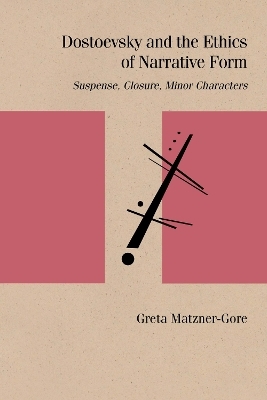
Dostoevsky and the Ethics of Narrative Form
Suspense, Closure, Minor Characters
Seiten
2020
Northwestern University Press (Verlag)
978-0-8101-4198-8 (ISBN)
Northwestern University Press (Verlag)
978-0-8101-4198-8 (ISBN)
Traces Dostoevsky's indefatigable investigations into the ethical implications of his own formal choices. Drawing on his drafts, notebooks, and writings on aesthetics, Greta Matzner-Gore argues that he wove the moral and formal questions that obsessed him into the fabric of his last three novels.
Three questions of novelistic form preoccupied Fyodor Dostoevsky throughout his career: how to build suspense, how to end a narrative effectively, and how to distribute attention among major and minor characters. For Dostoevsky, these were much more than practical questions about novelistic craft; they were ethical questions as well.
Dostoevsky and the Ethics of Narrative Form traces Dostoevsky's indefatigable investigations into the ethical implications of his own formal choices. Drawing on his drafts, notebooks, and writings on aesthetics, Greta Matzner-Gore argues that he wove the moral and formal questions that obsessed him into the fabric of his last three novels: Demons, The Adolescent, and The Brothers Karamazov. In so doing, Dostoevsky anticipated some of the most pressing debates taking place in the study of narrative ethics today. Can reading novels make us more compassionate and sensitive to emotional nuance? Or is the act of reading, instead, a variety of voyeurism? By placing Dostoevsky in dialogue with thinkers such as Wayne Booth, Suzanne Keen, and Alex Woloch and providing a fresh assessment of Mikhail Bakhtin's Problems of Dostoevsky's Poetics, this book makes an important contribution not only to Dostoevsky studies but also to the field of narrative ethics.
Three questions of novelistic form preoccupied Fyodor Dostoevsky throughout his career: how to build suspense, how to end a narrative effectively, and how to distribute attention among major and minor characters. For Dostoevsky, these were much more than practical questions about novelistic craft; they were ethical questions as well.
Dostoevsky and the Ethics of Narrative Form traces Dostoevsky's indefatigable investigations into the ethical implications of his own formal choices. Drawing on his drafts, notebooks, and writings on aesthetics, Greta Matzner-Gore argues that he wove the moral and formal questions that obsessed him into the fabric of his last three novels: Demons, The Adolescent, and The Brothers Karamazov. In so doing, Dostoevsky anticipated some of the most pressing debates taking place in the study of narrative ethics today. Can reading novels make us more compassionate and sensitive to emotional nuance? Or is the act of reading, instead, a variety of voyeurism? By placing Dostoevsky in dialogue with thinkers such as Wayne Booth, Suzanne Keen, and Alex Woloch and providing a fresh assessment of Mikhail Bakhtin's Problems of Dostoevsky's Poetics, this book makes an important contribution not only to Dostoevsky studies but also to the field of narrative ethics.
Greta Matzner-Gore is an assistant professor in the Department of Slavic Languages and Literatures at the University of Southern California.
Acknowledgements
Note on the Text
Abbreviations
Introduction
Chapter 1. Curiosity, Suspense, and Dostoevsky's Demons
Chapter 2. The Endings Of The Adolescent
Chapter 3. From The Corners Of The Brothers Karamazov: Minor Characters In Dostoevsky’s Last Novel
Conclusion
Selected Biography
Index
| Erscheinungsdatum | 02.07.2020 |
|---|---|
| Reihe/Serie | Studies in Russian Literature and Theory |
| Verlagsort | Evanston |
| Sprache | englisch |
| Maße | 152 x 229 mm |
| Gewicht | 633 g |
| Themenwelt | Geisteswissenschaften ► Philosophie ► Ethik |
| Geisteswissenschaften ► Sprach- / Literaturwissenschaft ► Anglistik / Amerikanistik | |
| Geisteswissenschaften ► Sprach- / Literaturwissenschaft ► Literaturgeschichte | |
| Geisteswissenschaften ► Sprach- / Literaturwissenschaft ► Literaturwissenschaft | |
| ISBN-10 | 0-8101-4198-1 / 0810141981 |
| ISBN-13 | 978-0-8101-4198-8 / 9780810141988 |
| Zustand | Neuware |
| Haben Sie eine Frage zum Produkt? |
Mehr entdecken
aus dem Bereich
aus dem Bereich


